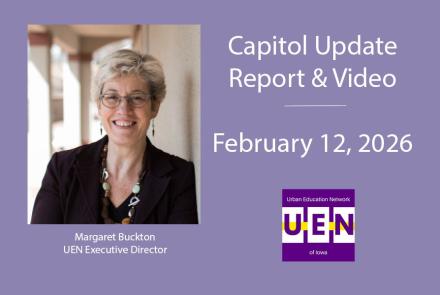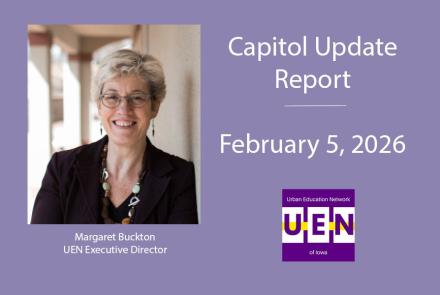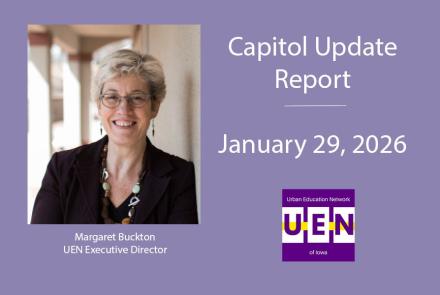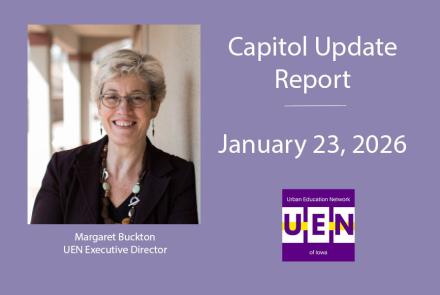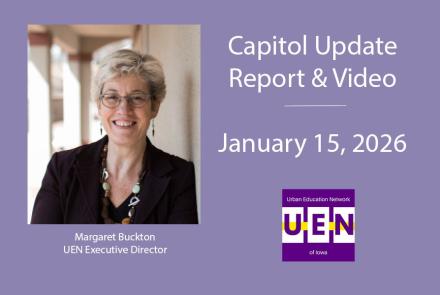Capitol Update - April 28, 2022
UEN Legislative Update
April 28, 2022
Week Sixteen of the 2022 Session: A few of the Governor’s Priorities were approved this week. The Governor signed some bills. No movement on the Budget or School Choice. This UEN Weekly Report from the 2022 Legislative Session covers the following:
- Big Policies to the Governor
- Other Bill Action Impacting Education
- Governor Signs a Few Bills
- Appropriations Bill Status
- Note about SF 2369 Governor’s School Choice/Voucher Omnibus
- Advocacy Actions and Links to Advocacy Resources
Big Policies to the Governor: there were several policy areas of contention between the House, Senate and Governor a few weeks ago. The following priorities were considered, compromises reached, and sent to the Governor:
- HF 2355 Unemployment Insurance: the bill reduced the eligibility period, however, did not require a week of unemployment before eligibility. The House resisted the Senate’s amendment. The Senate approved the bill without the additional week of waiting before receiving unemployment compensation, 30:14, sending it to the Governor. UEN was not registered on this bill.
- HF 2128 E-15 Promotion/Mandate: the bill mandates that gas stations offer E-15, with some waivers for smaller entities. The bill was approved by the Senate, 42:3 on Wednesday, the House concurred with the Senate, 81:13, sending it to the Governor. UEN was not registered on this bill.
- SF 2383 Governor’s Workforce Bill: the bill, another priority of the Governor and a workforce omnibus bill, has seven divisions. The provisions impacting education include:
- Work-based Learning: requires the DE to have a process for school boards to report annually on student participation in work-based learning programs. Requires the BOEE to develop certification for work-based learning supervisors. (The Governor’s original bill would have required 8th-grade career plans to include work-based learning/internships necessary for the student’s career. UEN was opposed to this provision, which was removed from the bill.)
- Military/Guard Licensure: requires licensing boards to adopt expedited procedures for licensure of military or guardsmen seeking licensure to work in Iowa, but during amendment, the Senate added the BOEE to a list of other licensing boards requiring waiver of fees for licenses to Iowans making less than 200% of the federal poverty level. The Fiscal Note shows the cost and revenue loss for the BOEE:

The bill was sent to the Governor, with the UEN registered as undecided. Although it is too late to change this bill, a provision could be included in either the Education Appropriations or Standings Appropriations bill to either remove this requirement from the BOEE or appropriate state funding to make up the shortfall.
Other Bills Impacting Education: the following bills received floor action this week:
- HF 2198 Childcare Working Age: Allows 16-year-olds to work or volunteer unsupervised at a childcare facility. Allows a parent to agree to have their 16-year-old submit fingerprints for a background check. Requires the DHS to allow childcare centers to increase the child-to-staff ratio to 1:7 for children two and under and to 1:10 for children three and older. Passed the Senate 31-18 (4/18). The House concurred, 52-42; sending it to the Governor. UEN was not registered on this bill.
- HF 2549 MH Loan Repayment Program: the Senate amended the bill to be the language in their version SF 2195, 29-15. After the amendment, the bill now establishes a mental health professional loan repayment program in the College Student Aid Commission. Requires the professional to practice for five years (full-time) or seven years (part-time) in Iowa as a condition of receiving the grant. Gives priority to Iowans and members of the Iowa National Guard. Limits loan repayments to $8,000 annually and $40,000 overall. The Senate passed it, 44-0, sending it to the House. UEN supports this bill.
- SF 2380 George Washington Carver Day: this bill declares February 1 George Washington Carver Day in Iowa. The House Administration and Rules Committee approved this bill, 14-0, moving it to the House Calendar. UEN was not registered on this bill.
Governor Signs Some Bills: on Friday, April 22, the Governor signed 26 bills into law. Among them, these three bills are of interest to education: These three impact Education:
- SF 2128 EL’s and CC Instructor Qualifications: the bill changes references from “limited English proficient” to “English learner” through the Iowa Code. Makes changes to community college instructor qualifications. Passed the Senate 48-0 and the House 99-0. Governor signed it. UEN was undecided on this bill.
- SF 2197 Special Education Task Force: requires DE to convene and support a task force on special education issues at non-public schools. Establishes the membership of the group and requires a report by Dec. 2022. Passed the Senate 46-0 and the House 94-0. Governor signed it. UEN was registered opposed to an earlier version but changed registration to undecided in this form.
- SF 2279 E-Bids: Allows governments to accept electronic bids for public improvements. Requires the time of receipt to be recorded electronically. Passed the Senate 48-0 and the House 99-0. Governor signed it. UEN was registered in support of this bill.
Status of Appropriations: the following table, also from the IALNS Bulletin, April 27, 2002, shows the progress of appropriations bills, all of which have been approved by the House with no action in the Senate but for the Transportation, Infrastructure and Capitals bill. The only remaining budget bill not discussed in the House is the Standings Appropriations bill, which includes state foundation aid, typically introduced as the last budget bill of the Session.

See the March 31 UEN Weekly Report for details of the Education Appropriations Bill HF 2575. One specific detail worthy of mention: Division X of HF 2575, amended onto the bill in the House, would have prohibited school boards from giving an outgoing superintendent severance pay exceeding three months of salary. Sen. Cournoyer, chair of the Senate Education Appropriations Committee, has told us that she intends to remove that provision from the bill in the Senate.
SF 2369 Governor’s School Choice/Voucher Omnibus: this bill is still in the House Appropriations Committee without a subcommittee assigned. See the March 31 report for all of the details, including the Parents’ Rights Provisions and Policies to Address Teacher Shortages amended onto the bill. The April 28 IALNS Newsletter states, “The House has not brought the scholarships to the floor due to a lack of support. Many House Republicans have not made a public statement on support or opposition to SF 2369, but as many as twenty House Republicans may oppose the bill.” We still believe this to be the case, but leadership negotiations are behind the scenes and ongoing.
If you are at legislative forums or connecting with your Representatives and Senators, the talking points in the March 31 UEN School Choice Call to Action are still relevant. However, at several meetings the Governor held last week in rural areas with school leaders, she mentioned the Education Savings Plan policies in Florida and Mississippi as good models. We did a little policy digging and have the following to share with you. No need to seek out your legislators with this additional information, but if it comes up in conversation, feel free to talk about it.
One initial disclaimer; Iowa already has considerable school choice options. There is no reason to believe that one more increment of competition would have any additional impact on quality. However, before agreeing with the statistics on test scores or anything else that suggests these are model policies, consider the following:
- Florida Review: NAEP (National Assessment of Educational Progress) scores for public schools went up in Florida after vouchers. That’s true. However, there were other Florida actions and some details about the vouchers that suggest it wasn’t because “competition improved outcomes for public school students.”
- Florida simultaneously invested in a Statewide instructional initiative, Every Child Reads, which provided resources and training for public schools to improve instruction.
- Florida implemented a statewide retention policy, whereby non-proficient students were retained in their prior grade (and thus not in the testing pool of the next grade). Private schools in Florida popped up and marketed to parents of these students, offering a school option that was less focused on testing (and paid for with the voucher).
- Many students with special education IEPS also received the vouchers, removing them from the testing pool.
- Iowa 8th grade students who are not receiving special education services scored 1 point higher than similar FL students tested. Even for those special education in public schools in Florida, they test a lower percentage of them than Iowa does (referred to as the inclusion rate in the technical appendix).
- The Mississippi legislature did a review of their voucher program in 2020.
- Many vouchers weren't spent and had to be returned. 36% of surveyed parents said that no private school would take their child.
- Parents finding a school to accept their child often had to sign a contract waiving special education rights if they enrolled in the private school.
- When students received special education services in private schools, those services were often provided by public schools.
- The Mississippi program started with eligibility only for students receiving special education services and for only $5 million, so less than 10% of what SF 2369 includes as the starting point for Iowa. Mississippi parents returned over $2 million to the state. Here's a link to the PEER Committee's Legislative Report: https://www.peer.ms.gov/Reports/reports/rpt649.pdf
Advocacy Actions This Week, no Change from Last Week:
- Watch your email for announcements if policies pop up that need quick outreach to legislators: As the Session winds down, we’ll keep you in the know.
- Send a note to your legislators: As most are home awaiting the announcement of leadership compromises, this is a good time to circle back and reinforce your local connections. Thank them for working on teacher shortage policies, improving the transparency requirements to what’s workable, and for being there to represent you and your district. If they had committed to you their opposition to vouchers, you could thank them for that as well.
Find Representatives here: https://www.legis.iowa.gov/legislators/house
Find Senators here: https://www.legis.iowa.gov/legislators/senate
- Check out your new legislative district and primary candidates for the Nov. 2022 election. Enter your address in this new map lookup tool on the legislative website to confirm your House and Senate district numbers: https://www.legis.iowa.gov/legislators/redistricting. Find names, phone numbers and home email addresses for primary candidates on the Iowa Secretary of State’s website, which publishes this information in a pdf found here: https://sos.iowa.gov/elections/pdf/Candidates/primarycandidatelist.pdf. Call them or send them a note, introduce yourself, offer to be a resource for them on education issues, and let them know what they can do to best represent and support the students, families and staff in your school district.
Connecting with Legislators at the Statehouse: To call and leave a message for a Senator, call the Senate switchboard operator number is 515.281.3371. To call and leave a message for a representative, the House switchboard operator number is 515.281-3221. You can ask if they are available or leave a message for them to call you back. You can also ask them what’s the best way to contact them during Session. They may tell you email, text message or phone call is the best way to connect with them during the Session, based on their personal preferences.
UEN Advocacy Resources: Check out the UEN Website at www.uen-ia.org to find Advocacy Resources such as Issue Briefs, UEN Weekly Legislative Reports and Weekly Capitol Video Updates, UEN Calls to Action when immediate advocacy action is required, testimony presented to the State Board of Education, the DE or any legislative committee or public hearing, and links to fiscal information that may inform your work. The latest legislative actions from the Statehouse will be posted at: www.uen-ia.org/blogs-list. See the 2022 UEN Advocacy Handbook, which is also available from the subscriber section of the UEN website.
Contact us with any questions, feedback or suggestions to better prepare your advocacy work:
Margaret Buckton
UEN Executive Director/Legislative Analyst
margaret@iowaschoolfinance.com
515.201.3755 Cell


